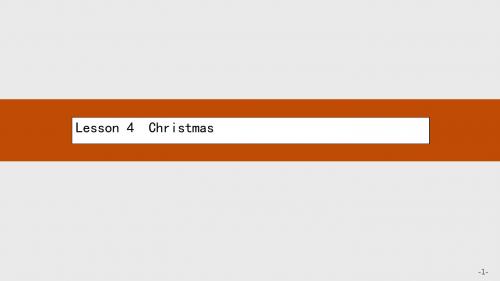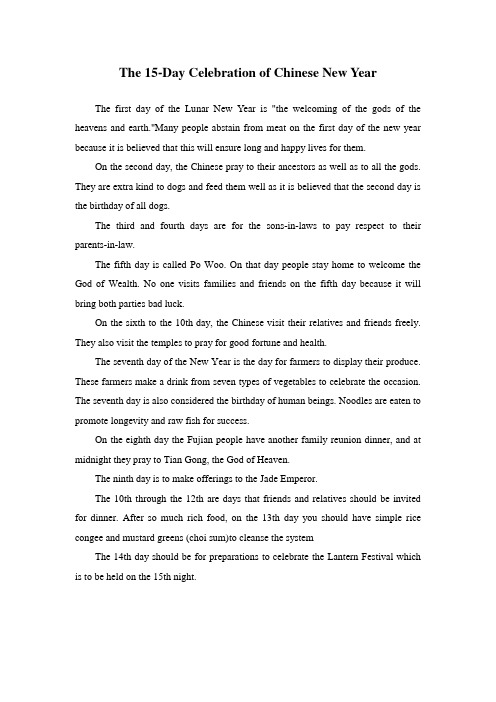最新北师大高一必修1Unit 3背景素材背景文字Christmas
- 格式:doc
- 大小:25.50 KB
- 文档页数:3

《Unit3-Lesson4Christmas》北师大版高中英语必修1CelebrationChristmasWhichdayisChristmasDay?ChristmasDayfallsonDecember25th.课件使用101教育PPT制作(/)DoyouknowtheoriginofChristmas?ItisthedaywecelebrateasthebirthdayofJesus.TheMeaningofChristmasIt’saboutgivingan dbeingthankfulforeventhesmallthingsinlife.BrainstormListsomewordsaboutChristmas:weatherpeopleChristmasfoodacti vitiesobjectsweathercold,windy&snowyfoodroastedturkeycandiesCh ristmaspuddingpeopleFatherChristmas/SantaClausfamily,relatives& friendsactivitiessendpresentsDecoratetheChristmastreehave snowballfightsactivitiesListentoQueen’sspeechattendcarolserv iceobjects2425calendarenvelopeobjectspresentsChristmasstoc kingsobjectspaperhatsballoonsobjectsdecorationsChristmastreeChri stmastreewithdecorationstockingsFatherChristmasChristmaspuddi ngturkey&cakeballoonssingChristmascarolChristmasFatherChristm asadventcalendarChristmascardsnativityplayChristmaslightscarols erviceChristmastreedecorationsballoonsbrandymincepiesstockingspresents;sweetsachocolatesixpenceatangerineroastturkeyChri stmaspuddingbrandybuttercrackerspaperhatsQueen’sspeechC hristmascake☆What’sthemainideaofeachparagraph?Para.1Para.2Pa ra.3Para.4Para.5a.activitiesonChristmasEveb.activitiesafterlunchc.thebeginningofChristmasd.decorationsoutsidee.activ itiesonChristmasmorningInwhatorderdidthechildrendothese things?2a.openthenewyearcalendar5b.puttheirstockingsat theendofthebedc.singChristmascarols3d.writealettertoFatherChristmas1e.putuptheChristmastree4f.gotochurch6g.h aveChristmascake7☆RetellthepassagewindycoldInthemiddle ofthe____,_______monthofNovember,wealwayswroteatotelling himaboutallthewewanted.letterFatherChristmaspresentsrece iveWithDecember,wecould________Christmascards,seeChrist maslights,______thetowncarolservicesandtheexcitingsnowballfights.attendhaveOnChristmasEve,thewholefamilyhelpedto_ _______thehouse,________theChristmastree.Weputattheendofthebedsbeforewewenttobed.decorateputupstockingsOnCh ristmasmorning,thestockingwasfullof_______________.Wewentto andhadforlunch.WesangChristmas_________andjokesandsillypaperhats.presentsandsweetsturkeychurchcarolslaughe datBybedtime,wewereall.Assoonasweturnedoffthelights,weallfellintoa,sleeptireddeephappyDetailedreading:readcarefullytofindouttheactivitiesandemotionsofthewriteraccordingtothetimeline.Para.1timepeopleactivitiesemotionsI nthemiddleofNovemberMysisterandIwrotealettertoFatherChristmasseriouslyPara.2timewhoactivitiesemotionsWithDec embercoming1.openedthenewyearcalendarWeexcited2.attended carolservice3.madesnowmenandhavesnowballfightsPara.3time whoactivitiesemotionsOnChristmasEveThewholefamily1.decor atedthehouseandputuptheChristmastree,thedecorations…expect inganxiouslyWe2.putstockingsattheendofthebeds3.triedto stayawaketoseeFatherChristmastimewhoactivitiesemotions OnChristmasday(morning&lunch)MycousinandIwentouttoplay withnewpresentstiredbuthappyWehadturkeyandpuddingatl unchsangChristmascarols,putonsillypaperhatsandlaughedatjokesBybedtime,fellintoadeephappysleepPara.4&5wrotealetterto…attendedcarolservicemade…andhad…fightsputstockin gsattheendofbedsdecoratedthehouseputupChristmastree…sang …,puton…hatsandlaughed…Atlunch,…had…fellinto…sleep课文解析:address1.称呼某人addresssb2.在信件,包裹等上写收件人或公司等的名字及地址addresssthtosb/sthaddressee收件人employer雇主---employee雇员trainer---traineeadventcalendar圣诞日历(12.1-25)nativityplay圣诞剧makesnowmen;havesnowballfightsputupthetent搭起帐篷putupthetree立起树mincepie 肉饼,碎饼mince肉末mincer绞肉机leavesbsthleavesthforsb留下,交代下某物Someoneleftthisnoteforyou.leavesthtosb=givesthtosb将某物遗赠给某人Leaveallone’smoneytocharity.tangerine-asmallsweetorange 柑橘sixpence-asmallsilvercoinworthsixpencepenny---pence便士playwithsb/sthplaysb=competewith/againstsbLaughatsb/sth1.因某人/某事而发笑laughatjokes2.取笑或讥笑某人/某事laughatsb3.不在乎某人/某事物;对某人/某事物不以为然laughatdangercarryondoing=keepondoing=continuedoing 继续做某事contentn内容Thecontentofthebookisverygood.vcontentoneselfwithsth满足或满意于某事物(虽然可能有更高的要求)adj.becontent/satisfiedwithsthbecontenttodosth知足、满足、满意、愉快contented做定语—心满意足的,满意的满足的acontentedsmile/personWriting:Memoriesof________.。




The 15-Day Celebration of Chinese New YearThe first day of the Lunar New Year is "the welcoming of the gods of the heavens and earth."Many people abstain from meat on the first day of the new year because it is believed that this will ensure long and happy lives for them.On the second day, the Chinese pray to their ancestors as well as to all the gods. They are extra kind to dogs and feed them well as it is believed that the second day is the birthday of all dogs.The third and fourth days are for the sons-in-laws to pay respect to their parents-in-law.The fifth day is called Po Woo. On that day people stay home to welcome the God of Wealth. No one visits families and friends on the fifth day because it will bring both parties bad luck.On the sixth to the 10th day, the Chinese visit their relatives and friends freely. They also visit the temples to pray for good fortune and health.The seventh day of the New Year is the day for farmers to display their produce. These farmers make a drink from seven types of vegetables to celebrate the occasion. The seventh day is also considered the birthday of human beings. Noodles are eaten to promote longevity and raw fish for success.On the eighth day the Fujian people have another family reunion dinner, and at midnight they pray to Tian Gong, the God of Heaven.The ninth day is to make offerings to the Jade Emperor.The 10th through the 12th are days that friends and relatives should be invited for dinner. After so much rich food, on the 13th day you should have simple rice congee and mustard greens (choi sum)to cleanse the systemThe 14th day should be for preparations to celebrate the Lantern Festival which is to be held on the 15th night.。

Christmas: The Global CelebrationChristmas is truly a global celebration! Although the traditions and foods associated with it vary with climate, culture, country -- even calendar -- the spirit of the day transcends all such differences.While possibly the most "popular" Christian holiday, Christmas has also evolved into a secular celebration. Ironically fitting, since the eventual acceptance of Christianity in most societies required missionaries and church hierarchy to meld Christian practices with the pagan or other non Christian religious beliefs of the native people.In Northern Europe, pre-Christian symbols of spirit worship have become Yuletide standards, such as the Christmas tree, mistletoe, holly, and ivy. Overindulgence at the dinner table, stringing Christmas lights, exchanging gifts, even burning the Yule log are traditions that can be traced back to the ancient Roman celebration of Saturnalia and various winter solstice rituals.Even in societies where Christianity is not the dominant religious belief, Santa Claus has become the reason for the season.Japan has celebrated Christmas since at least the 1930s and especially since World War II as a precursor to New Year celebrations. On Christmas Eve lovers treat each other to lavish gifts and children await Uncle Chimney. And there's no problem cooking that big dinner. Parents have been known to wait for hours lined up outside the local Kentucky Fried Chicken franchise to buy a bucket of chicken for their eager children. (At the root of this practice is the perceived similarity between Colonel Sanders and jolly old St. Nick.) Add to this an even older culinary tradition of feasting on strawberry shortcake (topped with a plastic fir tree) and Christmas Japanese style takes on a meaning all its own.Though many of us paint Christmas in the snow-laden colors of Currier and Ives prints, below the equator its summer. Christmas in Australia and South Africa ranges from the fowl or roast front and center in a dinner spread out over a formal table to a casual picnic in the great outdoors-Throw another shrimp on the barbie, mate?Nevertheless, despite the temperate weather, Christmas trees, mistletoe, holly, and European style gift giving accompany the festivities down under.Zaire, Rumania, and Poland share a common Yuletide bond -- folk plays performed in villages around Christmas time. These performances all dramatize various aspects of the Christmas nativity story, complete with caricatures of Herod and his soldiers, the ever-popular tax collectors, the Wise Men, shepherds, sheep, camels, donkey, Mary, Joseph, and the infant Jesus.Jamaica, as well as several other Caribbean islands and some African countries, favor such Christmas festivities as masquerade performances and parties. In Sierra Leone groups of school children march about town with their "devils" and stop at various points to present brief 12 to 15 minute performances, highlighted with devil dances. Less ominous than it appears, each group of boys and its respective Alikali Devil costume is sponsored and maintained throughout the year by local civic organizations.In Venezuela, "devils" of a different kind fill the streets shortly after midnight on Christmas Eve. Hundreds of rollerskating teens fan out about their about towns for an hour or so, finally making their way to church and a special early morning Christmas mass. Skating home, they find bountiful Christmas breakfasts waiting for them, featuring hallacas-cornmeal pastries filled with spicy meat, wrapped in banana leaves and boiled.Food and feasting seem to be universal qualities of Christmas celebrations. Where the indigenous population of a country has been influenced by the introduction of Europeans, the Christmas feast centers around a roast. Historically for Europeans settled by conquering Roman armies, the roast was a pig -- the traditional meal used to celebrate the Roman feast of Saturnalia. As many of these European countries began settling the Americas, turkeys were imported, raised, and substituted for pork.Countries of the southern hemisphere feature fresh fruits and vegetables at their Christmas feasts which are often communal. For while the north marks the winter solstice, in the Zulu homelands, Zimbabwe, and Peru the Christmas celebration overlaps the festivities associated with the summer harvest and the pre-Christianrituals of the native people. Leafy greens, young corn, fresh fruit, and ice cream often accompany to the roast, which is sometimes prepared whole on a spit when the feast is a village affair.Adding further to this seeming calendar of confusion, no one knows the exact date of Christ's birth, which, Santa Claus aside, is the basis for the Christmas celebration. For over 300 years it was a movable feast since early Christians tended to celebrate Christmas in conjunction with Hanukkah, attempting to mesh the old Julian and Hebrew calendars.Pope Julius I set the December 25 date on or about 336 ad in an effort to provide continuity from year to year and to counterbalance the various pre Christian festivals in competition with the spread of Catholicism. Although many of the Orthodox or Eastern Rite Christian churches have celebrated Christmas on December 25 since the middle of the fifth century, some chose to keep their festivities on the traditional date of January 6 or 7, known also as the Epiphany.Whatever the date or the practices associated with it, Christmas continues to be the most universally celebrated holiday around the globe, transcending language, culture, and even religious beliefs. Regardless of your reason to celebrate the season, I hope you find the spirit behind the holiday every day of the year!。